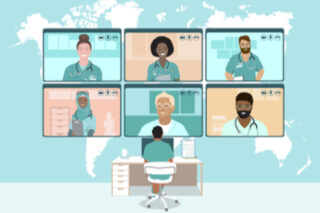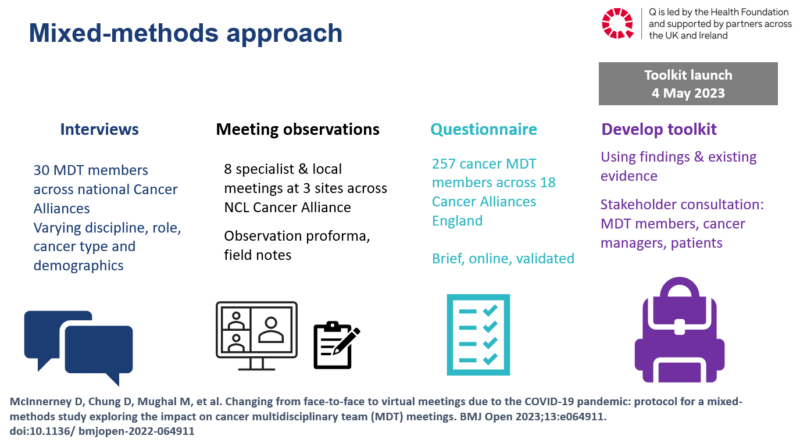Q Exchange
Resource pack for virtual cancer multidisciplinary team working
- Winning idea
- 2020

Meet the team
Also:
- Professor Muntzer Mughal, Consultant Surgeon, Honorary Clinical Professor, Division of Surgery & Interventional Sciences, University College London
- Dr Samantha Quaife, Senior Lecturer in Behavioural Science, Queen Mary University of London
- Professor Derralynn Hughes, co-clinical director, North Central London Cancer Alliance
- Professor Mick Peake, Clinical Director, Centre for Cancer Outcomes
What is the positive change that has emerged through new collaborations or partnerships during Covid-19 that your project is going to embed?
Input from several specialists, together with good communication with, and involvement of, patients are fundamental to the delivery of high-quality cancer care. Prior to the Covid pandemic, building on the Calman-Hine report (1995) NHS England had set out guidance for multidisciplinary team (MDT) streamlining diagnostic and treatment decision making during face-to-face meetings. The pandemic has, opportunistically, resulted in streamlining of some of the processes of the MDTs. A good example is that virtual MDT sometimes allowing more decision-makers to attend than was possible with a physical meeting and associated travelling. However, it is not a like for like translation.
Our resource pack will help MDTs on how to move a face-to-face meeting to an online meeting without comprising on outcomes, by addressing issues such as re-training of meeting chairs, thinking through the agenda to optimise attention spans, maintaining eye contacts and other virtual conferencing etiquettes to encourage participations.
What does your project aim to achieve?
The project aims to
- Learn from up to 3 cancer MDTs on their experience of virtual meetings so far, specifically what elements of team working we want to continue beyond the pandemic, and potentially what tasks are best left for physical meetings for now and the future
- Identify key enablers of effective virtual MDT working, quantify the time gains and how do we ‘spend’ the gains
- Use Plan-Do-Study-Act principles to work with staff on how best to incorporate elements of effective virtual workings amongst team members
- Share our improvement journey with other cancer MDTs to inform service configuration and resource requirements in London and elsewhere
This work will compliment parallel workstreams looking at different aspects of cancer care and outcomes from diagnosis to treatment that have been impacted by the pandemic, from route to diagnosis, diagnostic pathway and treatment to recurrence and survival.
How will the project be delivered?
From our conversations with teams since the start of the pandemic, it was evident virtual clinical decision-making requires team members to interact differently. Building on our work on MDT improvement led by Prof Muntzer Mughal, the project will examine a number of factors the new ways of working virtually by Cancer MDT members:
- Retrieve quantitative data from the MDT records on attendance, reflective of expertise available to the clinical decision making process, and efficiency using analyse on time spent per case, and number of people involved in each discussion as metrics.
- Conduct interviews and collate reflection of attendees to identify how teams can:
(a) accommodate for reduced attention spans;
(b) be savvy with technology to suit different styles of working
(c) prepare before meeting
(d) be clear on roles and responsibilities in virtual meetings
At the end of project, our findings will form a bitesize training package for Cancer MDTs.
How is your project going to share learning?
In addition to involving our clinicians and operational leads and commissioning colleagues in North Central London Cancer Alliance through our existing governance structure, the learning from the project will be shared with the Q community and the wider Health Service through:
- Discussion on twitter (#virtualMDT)
- National Cancer Programme Share and Learn webinars
- Working with UCLPartners, our Academic Health Science Network, to share learning through blogs, workshops and webinars
- Project update on Q Exchange page
- Share progress and learnings at activities organised by Q Exchange
- Sharing our bitesize training package on our website and FutureNHS Cancer Alliances Workspace
- Presentation at conferences
How you can contribute
- Learn from other Q members, sharing insights and knowledge on remote team working and clinical care
- Provide challenge to our theory of change on streamlining cancer MDT
- Opportunities to help us develop our idea in the context of integrated care systems
- Identify collaborators for future work
- Signposts to resources
Plan timeline
| 19 Feb 2021 | Share updated resource pack through Q, UCLP & National Cancer Programme |
|---|---|
| 21 Mar 2021 | Version 1 of resource pack out for testing |
| 12 Apr 2021 | Develop participant information sheet, consent, topic guides |
| 7 May 2021 | Project steering group meet - on going review and adaptation |
| 14 May 2021 | Reach out to cancer MDTs to gather feedback on project |
| 18 May 2021 | Develop Version 2 of resource pack based on feedback |
| 1 Jun 2021 | Expression of Interest process for teams |
| 15 Jun 2021 | Share updated resource pack through Q, UCLP & National Cancer Programme |
| 16 Jul 2021 | Teams selected & begin to co-produce resource pack |
| 1 Sep 2021 | Teams start collecting qualitative and quantitative data |
| 30 Nov 2021 | Update to local clinical and operational leads on early findings |
| 14 Jan 2022 | Identified key elements of resource pack |
Project updates
4 May 2023
QMUL and North Central London Cancer Alliance are pleased to launch our evidence based toolkit for running virtual and hybrid cancer multi-disciplinary team meetings.
The changes to clinical care brought about by the COVID-19 pandemic sped up the use of virtual meeting platforms in hospital trusts. Our toolkit is designed to enable cancer MDTs to capitalise on the opportunities, and overcome the challenges, associated with virtual and hybrid meetings. This will help optimise patient care by enabling more effective discussion and decision-making, as well as improving MDT members’ experiences.
We want to thank many cancer colleagues for sharing their best tips on how MDTs can embed new ways of teamwork. It is like a “box of chocolates”, practical recommendations and checklists that cancer MDT leads and members can use to plan and conduct their meetings, with simple guidance on how to optimise their online communication.”
The research behind the toolkit is published by the BMJ Open.
1 Oct 2021
When you are enjoying something, time seems to move more quickly. We are behind our schedule, but we have also learnt so much in a short space of time.
From implementation perspective, one of the key learnings is that engagement takes time and effort from both sides. The last 6 months have been challenging for our MDTs. They have hardly rested from Wave 2 of pandemic, some returned from their redeployments, before diving straight to elective recovery. The pressure has been immense and it didn’t feel right to ask them to pilot a toolkit straight away.
In the background the project team has looked thoroughly into the ways that we’ll collect feedbacks from our teams. Samantha has helped us developed the semi-structured qualitative interview questions, with the project teams fed through elements that we have gathered from informal discussions with teams on the ground. We have also made the decision to refine our questionnaire iteratively as the interviews are progressing.
To reduce burden for the MDTs, we will also be gathering intelligence by observing a MDT meetings where the teams make decisions which are often complex. We are developing an observation proforma and coding template, building on evidence of previous and emerging research.
We haven’t gone on the exact path we planned, but one thing the project has taught me is the importance of listening to the teams. The project team believe in the journey we are taking, and we look forward to our next update here.
I’m humming Frozen 2 theme song whilst typing this.
